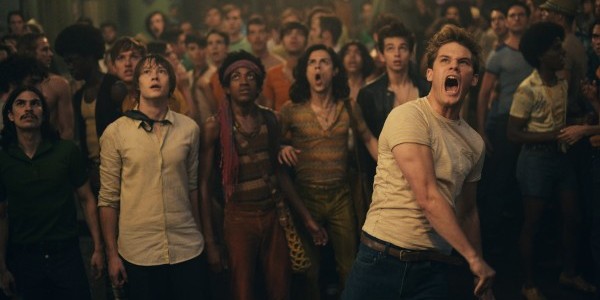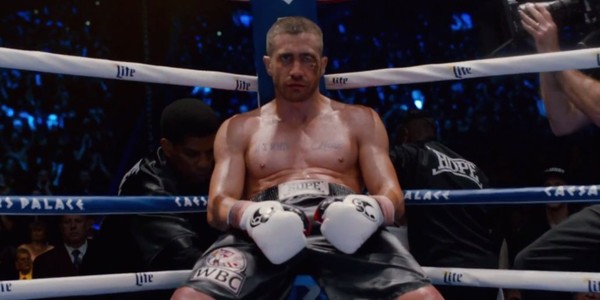A Guide To 2015’s Failed Oscar Bait

Alistair is a 25 year old writer based in Cambridge.…
Every year, it is easier for audiences to grow more cynical as awards season comes ever-closer, with the plethora of middle-of-the-road “prestige pictures” being dumped by the truckload at multiplexes worldwide, to indifferent audiences who would prefer to watch a star war.
For the standard movie fan, prestige season should be an embarrassment of riches, the best films of the year being released all at once like a smorgasbord of cinematic delights. But with each passing year, audiences have wised up to the cynical nature of these movies: the term “prestige picture” suddenly being replaced by “awards bait” in the movie nerd lexicon.
To understand what truly makes an awards bait movie, you have to look at the films that have followed a previously successful structure so carefully, even the Academy considered it cynical awards bait and neglected to throw any nominations in the directions of those film.
It is easy to think that awards bait is merely a film about a specific subject matter, yet Son of Saul, which depicts a day in the life of a concentration camp prisoner, could never be classified as such despite what it deals with. Awards bait is far harder to classify than initially appears – a broad, catch-all term that only truly becomes a mocking insult when the Academy fails to take the bait in question.
So, here are 2015’s failed awards bait films, the ones designed solely to gain platitudes and statuettes, that don’t even hide how well-trodden their brand of narrative formula has become. The term “awards bait” is thrown around pejoratively frequently these days – it is only when the formula doesn’t work, like it has failed to do here, that ensures the movie snobbery will continue.
Freeheld (dir: Peter Sollett)

It is a sad truth that LGBT themes are only ever acknowledged in mainstream cinema when awards season annually rears its head. Over the past few years, it has been films with transgender characters (played exclusively by cis-gender males) being released in order to curry favour with members of the Academy, likely in slack-jawed amazement that a heterosexual man could ever convincingly put on a dress and some make-up. Freeheld harks back to the Philadelphia-era of LGBT themed films, when all an actor had to do was go gay to get awards attention.
A dramatisation of a court battle that saw a terminally ill woman’s pension benefits not being sent to her partner due to outrage at the couple’s lesbianism, Freeheld is a brand of LGBT film that tries to cause audience uproar at the way LGBT people are treated in American society – even though its release during the midst of awards season is as cynical as anything presented in the film.
Oscar Bait Traits: Actress who won an award for playing a terminally ill character playing another terminally ill character (Julianne Moore), based on a true story, remake of documentary feature, comic actor in serious role (Steve Carrell), preachy song (Miley Cyrus – Hands of Love).
Stonewall (dir: Roland Emmerich)

No awards season is complete without a blockbuster director trying to go “serious”. For Independence Day director Roland Emmerich, it has resulted in his most critically reviled film to date. More so than Freeheld, Stonewall takes an important LGBT tale, then both whitewashes it (there are few people of colour in this film, despite how crucial they are in the true story) and even goes some way to make it palatable to straight audiences by making it heteronormative (Jeremy Irvine was chosen as the lead as he was “straight acting”).
After 2011’s Anonymous, his second attempt at Oscar-bait at least has more in common with his usual brand of film; what are the Stonewall riots if not a big-budget disaster movie in microcosm? Unfortunately, when making a mainstream film about an important piece of 20th century history, turning into a misguided action movie isn’t the best course of action.
The heavy fictionalisation of the story is at least redeemed by the fact the movie made barely $100,000 at the international box office; with many documentaries on the same subject, why would anybody want to see the man who gave us The Day After Tomorrow and 2012 equally play fast and loose with any historical truths?
Especially when their portrayal here is as detrimental to gay culture as a whole, Emmerich has erased lesbians, drag queens and trans people from history, instead letting us marvel at a group of attractive white guys who never really existed. I take my earlier statements back – 2012 proved to be more truthful.
Oscar Bait Traits: Based on a true story, controversial subject matter
By the Sea (dir: Angelina Jolie-Pitt)

For the second year in a row, Angelina Jolie has crafted another awards baiting attempt with By The Sea at becoming a serious auteur. Last year’s Unbroken was a surprise hit – not as earth-shattering as the prestige season positioning would have you believe, but still a step in the right direction for the director. With a drastically lower budget, Jolie now abandons the mainstream in order to curry favour with the arthouse; this is a film that wants a Palme D’Or as much as it wants Best Picture.
Brad Pitt stars along with his wife, playing an unhappily married couple holidaying in the South of France. Whilst at a hotel they become increasingly obsessed with a younger couple, only married a year and still without bitterness and resentment kicking in. Instead of morphing into a high-calibre character study or a dissection of relationships, the film proves thoroughly uninteresting. The majority of the film is spent watching glamorous people walk around glamorous locations, all the while feeling sorry for themselves.
It’s not that the film is too stiff, too quote-unquote serious that makes it problematic; its status as failed awards bait seems to stem from the idea of Jolie thinking that a lifestyle like this can be portrayed as anything other than aspirational. She wants to portray this lifestyle as empty and has just made something empty herself. An attempt at serious filmmaking that feels too calculated in its artsy ambitions.
Oscar Bait Traits: Director going “serious”, portrayal of glamorous celebrity lifestyle, family drama
In the Heart of the Sea (dir: Ron Howard)

Ever since Avatar crushed competition in the “technical” categories at the 2010 Academy Awards, groundbreaking 3D movies have been given releases in the peak of awards season. When great filmmakers experiment with the art form, groundbreaking films are often produced; Hugo, Life of Pi and Gravity feel like labours of love at utilising new technology, not just cynically trying to get audiences to pay £2 to buy some glasses.
Ron Howard’s latest film, In The Heart of the Sea, was due for release back in March, however, studio executives pushed the release date to a week before the force would be awoken, presumably in the knowledge that its groundbreaking use of 3D would prove to be a prestige favourite, likely to hold its own against rebel forces.
Ron Howard has two filmmaking styles: awards-baiting (Apollo 13, A Beautiful Mind), and shamelessly mainstream (The Da Vinci Code). As such, he is a hard director to pin down stylistically; the auteur theory ceases to apply for him due to the wild inconsistencies of his back catalogue.
Whereas James Cameron, Martin Scorsese, Ang Lee and Alfonso Cuarón all made very distinctive 3D films that felt of a piece with their filmographies, Howard’s lack of directorial distinction renders his application of technology irrelevant. Alongside the commercial bellyflops of Everest and The Walk, 2015 was the year auteurist attempts to reinvigorate the dying art form of 3D proved unfruitful.
The middle-of-the-road style of filmmaking favoured by Howard turns a remarkable true story that inspired one of the most highly regarded works of literature of all time into forgettable awards bait. Further points to be deducted for portraying author Herman Melville as a bookish nerd, when in reality he was actually the embodiment of masculinity; not that playing fast and loose with the truth has stopped Howard from getting awards before.
Oscar Bait Traits: based on a true story, director going “serious”, director experimenting with “new” technology, adaptation of non-fiction novel, related to highly regarded work of pop-culture
Fathers and Daughters (dir: Gabriele Muccino)

Now for that other awards season favourite: the underwhelming family drama. A multi-generational would-be epic from the director who brought us The Pursuit of Happyness and Seven Pounds, Fathers and Daughters unbelievably casts Russell Crowe as a Pulitzer Prize winning author.
It is said to Crowe’s detriment that most of his films are boorish prestige pictures, desperate for awards; if he appeared even remotely believable as an acclaimed author, he would have a full trophy cabinet this season. Crowe plays a widower, recovering from a trauma-related breakdown after his wife died; now he has to step back into reality and raise his daughter alone.
Boasting a phenomenal supporting cast that leaves you bemused as to what they saw in such meandering material, Fathers and Daughters is the film on this list most representative of what an awards baiting film is. Just look at the above description and highlight a few buzzwords; family drama, mental illness, widower.
The trailer elaborates on all of these, by selling it as awards bait in microcosm: the mental breakdown Crowe suffers ensures he delivers a ton of tics and spasms that members of the academy think qualify as “best acting” rather than “most acting”. Heck, if the trailer was eligible for awards consideration, I’m sure it would get at least a nomination.
Oscar Bait Traits: sentimental score, mental illness, previous Academy Award winner playing somebody with mental illness, general preachiness towards subject matter
Secret in Their Eyes (dir: Billy Ray)

Less cynical in terms of subject matter and execution, yet far more cynical in terms of its reason to exist is Secret In Their Eyes, the Hollywood remake of Argentinian drama The Secret in Their Eyes (El Secreto De Sus Ojos). Although I’m not as bowled over by the original film as many are, I understand the love for it; it contains breathtaking cinematic spectacle (the one-take shot entering the football stadium is astounding) and tells a grown-up story without any narrative concessions to those not keeping up.
Hollywood remakes of foreign hits aren’t always a given, planned remakes of Amélie and Intouchables have long since been shelved, but when they are, they are geared for prime release in the middle of awards season. The thinking is simple: the rest of the world loves this story and believes it is rightly acclaimed, so why won’t American audiences take to the remake in the same way?
The original Secret in Their Eyes won Best Foreign Language film in 2010; to remake a lesser known foreign-language film is one thing, but to remake a highly acclaimed one and expect the Academy to equally bestow critical adoration upon it is another thing entirely. Although some deviations have been taken with the narrative, the indistinctive directorial style provided by Billy Ray doesn’t put a unique stamp on it. This take on the story is likely to send any Academy members forced to watch it back into the loving arms of the original.
Oscar Bait Traits: Based on a best-selling novel, remake of awarded foreign film, all-star cast of previous award winners/nominees
Legend (Dir: Brian Helgeland)

With its show-stopping twin central performance from Tom Hardy, Legend garnered awards attention before it even premiered. An actor of Hardy’s calibre is due recognition, although his fondness for genre pictures has made that to be forever elusive. Yet, a dual central role in Legend seems perfectly calculated to show his range as an actor.
The only problem is the film that surrounds him is utterly, soullessly empty, a generic British gangster picture only given prestige by a better than expected cast and a foreign director unaware of the cliches that come hand-in-hand with British gangster films.
Along with Black Mass, Legend has helped prove that 2015 is the year that unsuccessful gangster movies can now be classified as awards baiting. With Scorsese’s films still receiving tons of nominations with every subsequent release, it is amazing it has taken this long for other filmmakers to imitate his style in a way designed to obtain critical adoration; the style of a Scorsese film that feels effortless is definitely not present here, due to how cynically it has attempted to be reproduced.
Oscar Bait Traits: Based on a true story, dual performance, gangster biopic
Southpaw (dir: Antoine Fuqua)

Back when the awards season was still in its infancy at the height of summer, Jake Gyllenhaal’s performance in Southpaw was widely dubbed as an Oscar favourite, somewhat inexplicably to me. Ever since Rocky brought the narrative template for an underdog sports movie to prize-winning glory, boxing movies have followed pretty much the same template ever since.
Southpaw asks us to care about an egotistical arse returning to the apex of popularity. It’s not a rags to riches tale, it’s a riches to riches tale. After losing a ton of weight for Nightcrawler, Gyllenhaal beefed up for this role; a physical transformation that begs for awards recognition merely by doing the act of putting on the weight alone.
Southpaw is an uninteresting, unremarkable boxing melodrama, and its desire to be the new Rocky is frankly laughable. That it does nothing with old cliches shouldn’t be a problem – after all, Creed is stepping into the Oscar ring as a firm favourite, despite not changing the formula popularised by Stallone’s original film four decades earlier.
Oscar Bait Traits: physical transformation by actor, boxing movie
The Program (dir: Stephen Frears)

Several documentary movies have been transformed into narrative pieces this year, the most high profile being Robert Zemeckis’ Man on Wire adaptation The Walk. Transforming The Armstrong Lie, a documentary by the wildly prolific Alex Gibney, into a feature film seems like a solid proposition. A character like Lance Armstrong is truly stranger than fiction, giving many actors a performance that gathers awards attention, due to the physical transformation required to play the controversial true life figure.
After the awards success of previous film Philomena, an awards-friendly reimagining of a true life tale, director Stephen Frears sticks to the same formula: a journalist (played by an acclaimed comic actor in a serious role, here Chris O’Dowd) getting righteously angry about an injustice in society, that warps controversies into human interest puff-pieces.
But the film is a biopic in the most literal sense; it merely dramatises everything that happened with the cinematic urgency of a Wikipedia article. Although containing a show-stopping central performance, the role comes courtesy of character actor Ben Foster, whose lack of household name recognition becomes a problem in transformative roles. For most audiences, this would be their first exposure to him and wouldn’t realise the physical transformation taken place.
A performance like this is crying out for an Oscar, even if it is calculated that way; coming from an unfamiliar actor, it doesn’t feel like a transformation but an establishment. This isn’t a criticism, but when it comes to awards bait, it’s a casting decision that fatefully blew the film’s chances out of the water. Also, taking performance enhancing drugs to help him better understand the role was a poor decision for Foster – he hasn’t made it to the Oscar race, let alone started it.
Oscar Bait Traits: Based on a true story, based on a documentary, adaptation of a best-seller, physical transformation by actor, controversial news story
Furious 7 (dir: James Wan)

As the Oscars have repeatedly been criticised for not catering to the tastes of younger audiences, annually they throw the bone to the franchise blockbusters “real people” want to watch. This year it seems probable Fury Road and even The Force Awakens will appear in the nominees list.
One movie that won’t make the list is the sixth highest grossing film of all time, Furious 7, a film that its star believes is the only worthy winner this year. In April, Vin Diesel told Variety; “Universal is going to have the biggest movie in history with this movie, It will probably win Best Picture at the Oscars, unless the Oscars don’t want to be relevant ever.”
Throwing down the gauntlet, but essentially inviting ridicule, Diesel continued about to wax lyrical about why his movies are shamelessly overlooked by the stiff upper-lipped members of the Academy who don’t want to be relevant, ever.
As quoted from the Variety article: “The head of the studio, Ron Meyer, often said when Fast 5 or Fast 6 came out, ‘If there was no number attached to these movies, they would be contenders for Best Picture.’ And when people see Furious 7, they are going to agree.”
Which is exactly why The Force Awakens and Fury Road will be contenders: they don’t have numbers in their respective titles, of course they are worthy! Underneath the c*cksure bravado, Diesel is also a realist. He never suggested any of the performances would be nominated, although after Heath Ledger’s turn as The Joker won a posthumous Best Supporting Actor Oscar, he could have easily hyped Paul Walker’s performance. Through rose-tinted glasses, the Academy could easily recognise him as something other than a bad actor.
Which 2015 movies would you define as awards bait? Do any movies on this list deserve recognition?
Does content like this matter to you?
Become a Member and support film journalism. Unlock access to all of Film Inquiry`s great articles. Join a community of like-minded readers who are passionate about cinema - get access to our private members Network, give back to independent filmmakers, and more.
Alistair is a 25 year old writer based in Cambridge. He has been writing about film since the start of 2014, and in addition to Film Inquiry, regularly contributes to Gay Essential and The Digital Fix, with additional bylines in Film Stories, the BFI and Vague Visages. Because of his work for Film Inquiry, he is a recognised member of GALECA, the Gay & Lesbian Entertainment Critics' Association.













